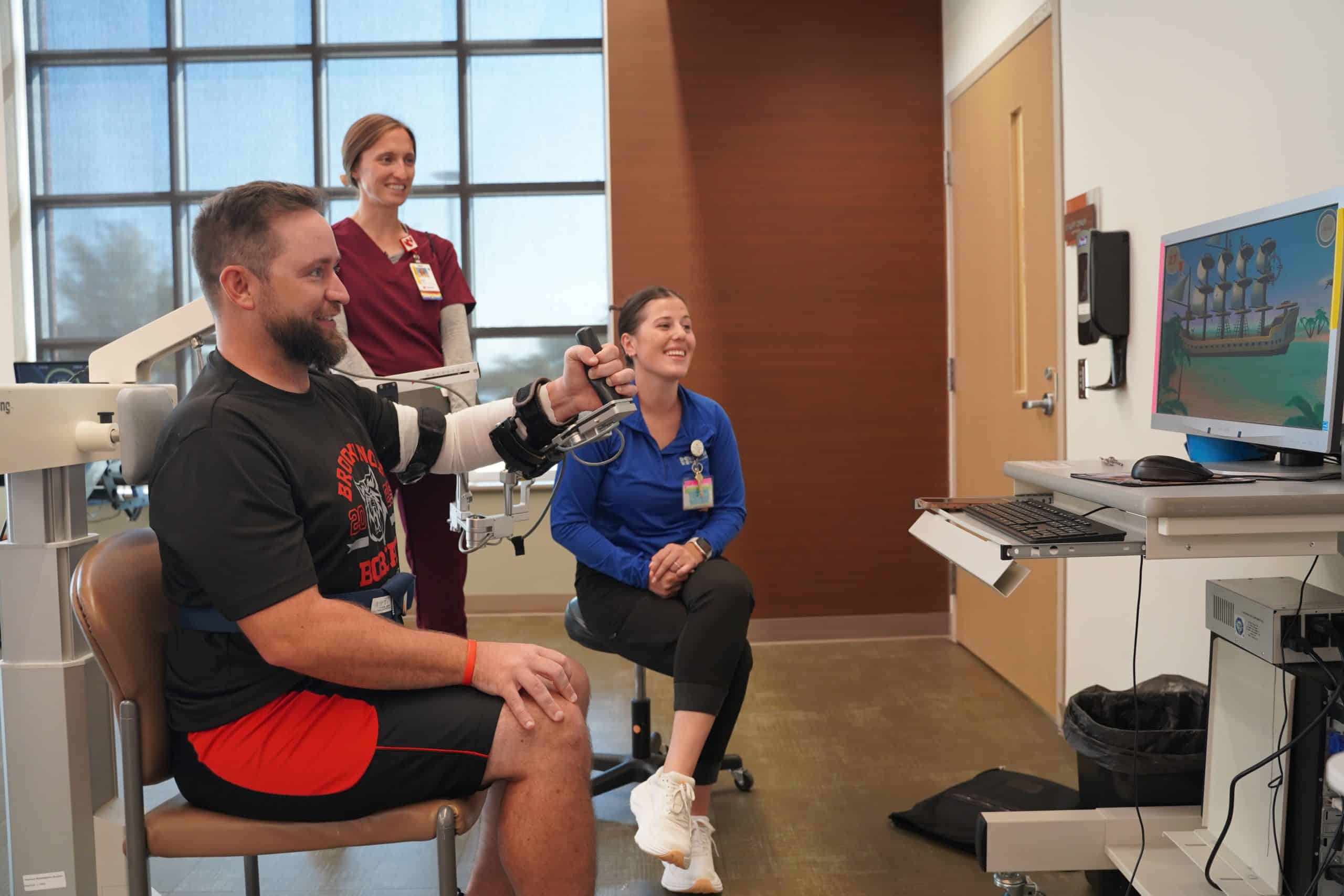Ty Schneider feels most at home on the football field. He loves the atmosphere, the adrenaline, and the chance to coach players to be their best on and off the field. After a stroke in August temporarily sidelined him, the young father from Brookings, South Dakota, is proving he’s willing to put in the same time and effort he preaches to his students.
“I always tell my players, it’s not what happens. It’s how we react,” Ty said. “I’ve tried to really take that to heart myself. There are a lot of times when you have setbacks and you want to quit, but I’m trying to live those words I have spoken and be a good example for my sons and players back home.”
It was after a Friday night football game in August when Ty started to feel unwell. A worsening headache and nausea led him to tell his wife, Sara, that he needed to go to the hospital.
“Those are words I’ve never heard come out of his mouth before and it was like, ok, this is serious and we need to go now,” Sara said.
Doctors discovered the stroke was caused by a dissection—a slight tear in a blood vessel that led to clots blocking blood flow to his brain. Ty said doctors linked it to frequent and forceful cracking of his neck.
The stroke affected his left side, making it difficult to open his hand or walk without losing balance. After 10 days at Avera McKennan Hospital in Sioux Falls, he transferred to Madonna Rehabilitation Hospitals, ready to tackle the next challenge.
“The more we looked into it and asked doctors and nurses, every time we brought up Madonna, right away, they were saying it’s top tier, with the best facilities, the best people and the research to back it up,” Sara said. “It’s like, if we’re going to do this, why not do this at the top level?”
At first, Ty struggled with his stamina and coordination. Tasks that were once automatic required intense concentration.
“It’s humbling getting help with, at least at the start, with eating, with walking, with going to the bathroom,” Ty said. “It’s tough to accept that help but I think it really makes you thankful for your team. When you go through something like this, you learn who is on your team. It’s humbling to think about all the people that want to help you get to your goal.”
Just as Ty draws up defensive play calls, his care team designed a customized care plan. Physical therapist, Kailyn Wiseman, PT, DPT, says coaching a coach was a rewarding challenge.
“We treated every session like it was a practice,” Wiseman said. “It was competitive and intense, but that is an environment that he thrived in.”
Specialized technology such as the Motek GRAIL treadmill and virtual reality system helped push Ty further. The ArmeoSpring device enhanced his arm strength and coordination, appealing to his competitive nature.
“He could see his grip strength improve through his scores,” occupational therapist Megan Jensen, MOT, OTR/L, CBIS, said. “He was always trying to beat his last one.”
Throughout his stay at Madonna, Ty’s sons served as cheerleaders and assistant coaches. His care team included them in therapy to provide extra motivation for him, as well as engage them in their dad’s recovery.
“His wife and children are a big part of his life, and it was really important to include them from a mental health aspect,” Jensen said. “Showing them all what life can be like after this and also bringing his sons into therapy gives them their dad back and shows them they are still able to do fun things with him.”
Even when participating in his own therapy, Ty continued to motivate others. He encouraged fellow patients in the hallways and spoke with a young football player recovering from injury.
“As a teacher, I don’t think I’ve ever lost by investing into kids,” Ty said. “I’ve lost game plans and lesson plans, but relationships always come first. That’s what I’m thankful for—the selflessness of the people here who put relationships first.”
Despite being far from home, Ty said Madonna felt like being among family.
“I think the Madonna facilities are amazing, and the technology is amazing, but it’s really the people that set it apart,” Ty said. “So many people here are giving of themselves, and they care about the patients here and I think that’s the most important thing.”
By the end of his stay, Ty was walking independently, even jogging lightly. His grip strength and coordination returned, and movements felt natural again.
When he returned home, one thing was on his mind—celebrating with his team. He surprised the Brookings Bobcats ahead of their Homecoming victory over the Roosevelt Rough Riders.
“Sometimes when you go through tough times, it’s hard to be thankful, but there are so many things for me to be grateful for,” Ty said. “This experience will always stick with us.”
When asked what he hopes his sons, students and players learn from his story, Ty says he wants them to understand the importance of resilience and perseverance.
“I want to be a role model that my team can look at and say, ‘Yeah, he went through hard stuff but he’s going to continue on.’ Life may not be perfect but we’re going to get there.”
Team effort helps football coach tackle stroke recovery





